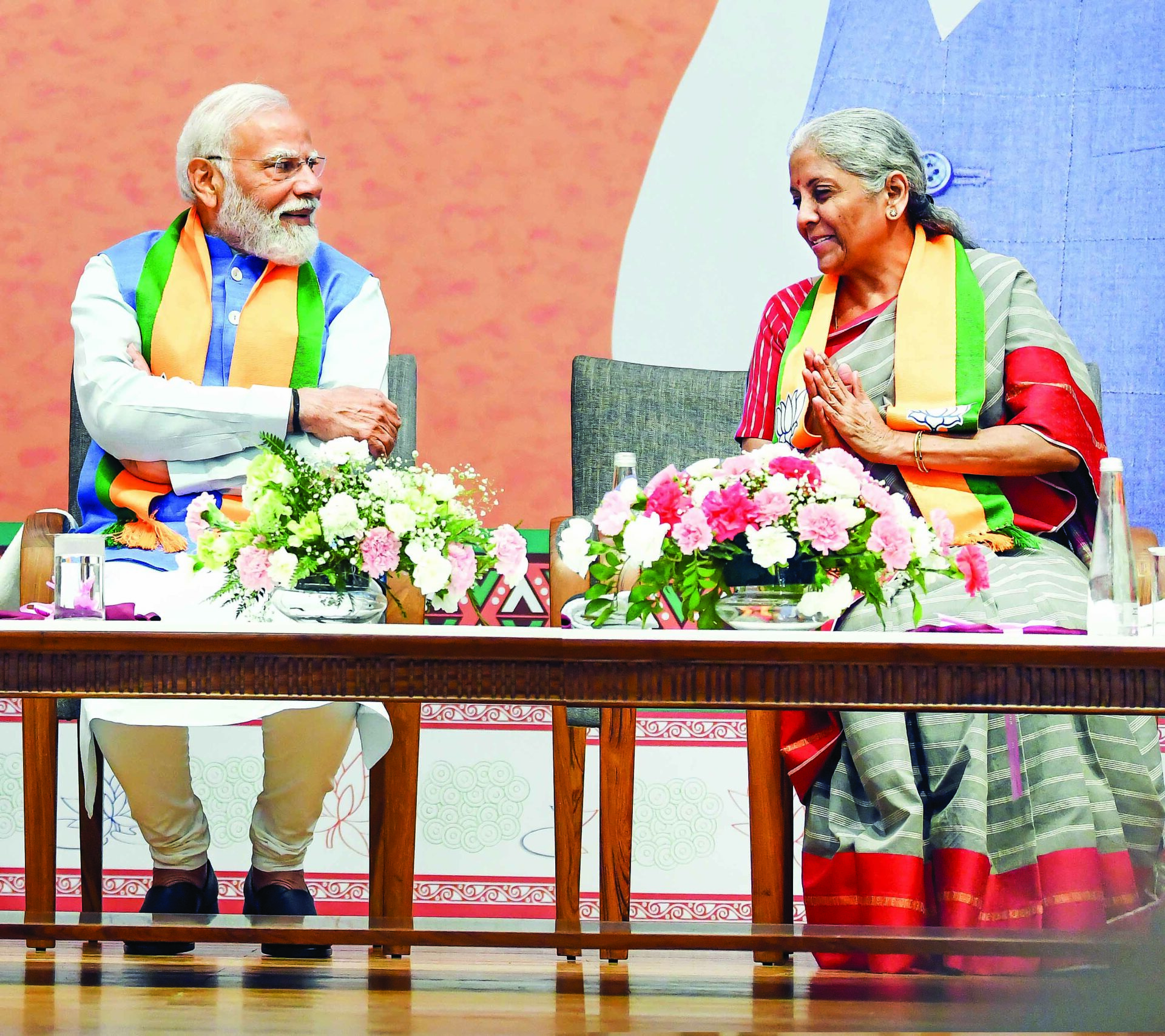NEW DELHI: ‘Banks don’t ask Government of India anymore for money to do business. They go to the market like any other business, raise capital in the market, and with that do business and earn profit. It’s a lot more professional way of doing business.’
Finance Minister Nirmala Sitharaman spoke to The Sunday Guardian.
Q: What would you say have been the biggest economic achievements of the Narendra Modi government in the last 10 years, specifically in your tenure as Finance Minister?
FM: Ensuring investments in building public infrastructure, be it digital infrastructure or physical infrastructure. Through that, we had a greater multiplier effect as a result of which the entire economy benefitted. Post Covid has shown distinct results and that is why unlike many economies abroad, the Indian economy has revived quickly and today we are the fastest-growing economy. We have not forgotten the states, we have given them 50-year interest-free loans, without any conditions so that they can build whatever they want as a priority for their states. Rs 3.87 lakh crore was allocated for states as 50-year interest free loans to incentivise capital expenditure. Many states have built good infrastructure for themselves with that.
Q: What were the biggest challenges that you faced when you took over as Finance Minister and how did you take them on?
FM: From the moment I entered, there was a liquidity crisis and credit was not reaching everybody. We had to do an outreach programme all over the country. This was in 2019. There was this serious problem that the middle class faced of having taken home loans to purchase their apartments but not getting possession of their flats. They were paying EMIs as well as rent. Two cases were prominently discussed in Delhi—in the Noida area, of Jaypee and Amrapali which went to the courts. So we designed the “single window method” through which such promoters, who had no money left to complete the projects were helped in a very graduated manner so that they could complete the projects and hand over the keys to the people who were waiting for 8 or 9 years. It was a major challenge but I was happy as that year itself we were able to give a solution. That programme continues till now, it has gone to Tier-3 cities, leave alone the metropolitan cities. This was a big relief for the middle class.
After that there was Covid, when moratorium had to be given, as nobody had anything to produce. No income was being generated, tax collection was negative, and that was the case with GST as well. We did not even have a template on how to deal with such a situation. There was never a precedent based on which we could learn lessons and work. We were learning as we were going.
The third challenge was that post the first round there was a second round when we thought we were coming out of it (Covid), because of which we had to provide further support. We supported the MSMEs and others a lot.
After that, there was the interesting challenge of hosting the G20 Presidency in India. We were always a part of G20, but to run the presidency in India with delegates coming from all the G20 countries, hosting them in different parts of India, to plan for a year-long event of that order, ensuring that there was a declaration during the G20 Summit—it was a beautiful challenge which I enjoyed being a part of. G20 gave a lot of prominence to India’s decision-making, its digital public infrastructure.
And now we’ve come to the election year.
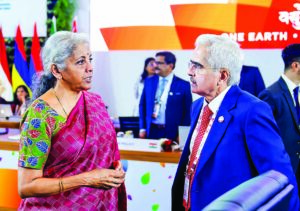
Q: Can you tell us about how the GST reforms have brought in transformation in the country, especially the way tax collection has gone up?
FM: From the beginning, it was a good scheme, a good program, a good effort at getting the entire country to be a part of a single taxation template. Single taxation need not necessarily—at least to begin with—mean only one rate of tax on all commodities. However, there is a single system through which this is all happening, in which all the states were brought in. The effort of the Prime Minister and Shri Arun Jaitley to get that work done itself is amazing. It is historic that you could bring in all the states to agree.
But when I came in, it was still the teething period. It (GST) was brought in 2017 and in 2019, there were still some issues prevailing. It was not meeting the challenge of the enormous inputs which had to come into it, filing of returns and everything. So, the system had to be improved. When we started improving the system came the initial stages when ships and containers were not coming from China, so software was not available. In fact, I was grateful to Nandan Nilekani, whom we called. He assured us that he would take care of upgrading the system so that it was not going to be painful for the taxpayers.
Post that, a lot of changes have happened. Improvement happened rapidly, efficiencies were brought in and the GST officials, both at the state and central levels started understanding each other’s intent. Now efficiencies are there, slippages are contained, evasion is completely avoided.
Some Congress members and Communists say, “You’re taxing a poor man on even day to day items.” Let me assure you, when GST was brought in, the revenue-neutral rate was 15%. If you were to tax an item at 15%, you didn’t tax it more than what it was before, nor did you gain anything newly in terms of revenue. That’s revenue neutrality.
So prior to GST, whatever was the rate, the rate at which it is being taxed at the point in time when GST was brought in, if you were to tax at 15%, you were still revenue neutral and you didn’t bring newer tax rate. But actually today we are at 11%, meaning, you can tax up to 15% and be revenue neutral and be sure that you are not more than what it was before. But we are taxing far lesser, but even then your revenue collection has gone up. So efficiencies have come in.
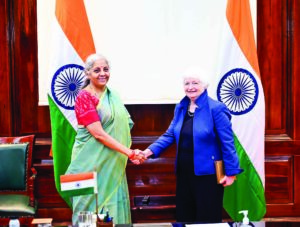
Q: Once the conversation was all about NPAs of banks. It’s not there anymore. Do you believe that the banking reforms have been able to put India’s banking system on a strong footing?
FM: You would’ve seen in news how banks are announcing the profitability they’ve reached and how their valuation has gone up. They’re going to be able to give better dividends to the shareholders. Look at this differently, if they were earlier asking Government of India to give money because they were running short of money for their business development, for further lending, they used to ask the Government of India, which grudgingly would give them the money. End of the day they’d justify by saying “anyway we are giving you dividend”. You’re a shareholder, you are getting dividend naturally, but you’re also infusing development capital constantly. It didn’t make sense. But after this reform, after continuous improvement, making sure NPAs are brought down and making sure they are professionally run, today, the profitability has gone up, you are seeing that in the records, the dividend is going up, you are also seeing that in the records but just test once more on another factor. Banks don’t ask us for money anymore. They don’t ask the Government of India anymore for money to do business. They go to the market like any other business, raise capital in the market, and with that do business and earn profit. It’s a lot more dignified way, more professional way of doing business. That’s what Indian banks are doing today.
Q: The world is looking at India’s digital infrastructure model for replication. How is India helping in this?
FM: India is talking and helping out other countries who seek to replicate our digital infrastructure model. In fact, during the G20 India presidency, even developed nations were astonished to know that the India Stack has so many different elements in it. We are using it for CoWIN, for vaccination, for telemedicine, for seeking expert medical advice, for disbursing loans, etc. Digital approach to work is the way to go.
Take the QR code revolution which has touched even the remotest corner of India. I recall going for a campaign to the farthest point of Mizoram bordering Myanmar, to Mara Autonomous District Council, and every single small store there had their QR code displayed. So India’s digital revolution is not just in some main metropolitan parts, it has even reached the far-flung areas of the country. Pineapples from Tripura and Nagaland are reaching the European Union markets by just booking orders on digital platforms. Messages are coming on the smartphone in one’s mother tongue.
These achievements are a result of the commitment of the government to get the nation digitized for the common man. These are rapid changes. India’s success story was discussed in G20 and many nations wanted some aspects of it. PM Modi even announced his willingness to share it (the technology) with the other nations.
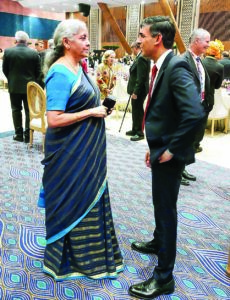
Q: Have the initiatives on “ease of doing business” helped to bring FDI? What can be done in Modi 3.0 to improve the situation further?
FM: This has brought about confidence in our Indian businesses. They know this government is serious about reducing the compliance burden for businesses. So Indian owned businesses are feeling a lot more at ease in doing business.
FDI of course comes in due to the policies adopted—predictable policy. There has to be stability in government, no flip flops in policy or taxation, there has to be certainty and ease of doing business. All of this together helps FDI to come in. Some states are doing much better than others in terms of getting FDI, but the ones behind are also trying to match up.
Q: In Modi 3.0 what sort of third generation reform agenda are you planning on?
FM: Reforms will go on, and will go to the third tier of elected governments—the urban local bodies, the panchayats. They will be brought in because they are the next layer where there has to be more ease of doing business, more openness towards investments, more understanding that investment comes to them first and only then grades up, upwards. If the land belonging to a panchayat is not going to be given up for setting up industry with ease, it’s just not going to draw investment.
You can have a great policy at the Centre and a welcoming state but it is just not going to work out if the ground reality does not reflect the same.
Q: What are the government’s plans to make the lives of the middle class easier in Modi 3.0?
FM: Everything that we have done till now is aimed at two aspects of the middle class—for those who have just come out of poverty, or are at the lower end of the middle class, our aim has been to provide them with affordable housing; but not under the PM Awas Yojana, but the subsidy which is being given on affordable housing, provide rental housing spaces; ensuring that they don’t need to pay income tax up to Rs 7 lakh. We have also given significant importance to educational institutions, set up many universities, AIIMS, medical colleges, we are increasing seats in the medical colleges. All this will benefit the middle class. So keeping the middle class in mind a lot of things have been done over the last 10 years. But the middle class is spread over the spectrum. You have them in agriculture, in industries, in the service sector, as well as as self-employed groups. Startups are all middle class. So we have done a lot of things, but there can still be expectations.
Q: According to the Opposition, job generation has been a major failure of the government. What is your view?
FM: I would first of all say that it was our government under Prime Minister Modi that brought the periodic labour force survey through which we were able to get the authentic numbers on formal sector employment. Also look at the EPFO data—the net addition to jobs is always shown through the EPFO.
Similarly, who are the ones getting PM Mudra loans, or SVANidhi loans? Who are the ones benefitting from PM employment guarantee schemes? Since October 2022, through the Rozgar Melas, the Prime Minister himself has given letters of appointments—10 lakh jobs there.
Startups that have become unicorns are not just one person sitting and doing the job, they are creating jobs. Our emphasis is on job creators. We want more job creators in the country.
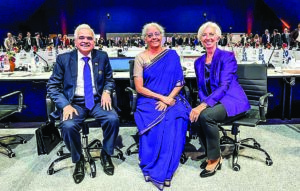
Q: What is your view of Rahul Gandhi’s talk about wealth redistribution?
FM: I think they are very confused. They have not done their homework. They are saying I am going to take it from Peter and pay it to Paul, but these are not Robin Hood days. You need to be a lot more responsible about how you want to make people earn more, you cannot make the rich poor in order to make the poor richer. That approach itself is wrong.
Q: The Opposition says that the government has been favouring certain corporates at the cost of the common man. Is that a fair charge? What’s your counter?
FM: Well, on asking for proof they have nothing to offer. Tell us in what way we have favoured the large corporates? By giving Ujjwalas to corporates? Is PM Awas Yojana for corporates? Is Nal Se Jal for corporates? Is Ayushman Bharat, where Rs 5 lakh insurance is given for every family, for corporates? Is Jan Dhan Yojana for corporates? I think the opposition has no concrete example with which they can say that this much is being given away to corporates.
Q: What sort of a foothold has the BJP got in Tamil Nadu?
FM: Tremendous efforts have been put. Prime Minister has given direct attention to Tamil Nadu in the last 10 years. State unit president K. Annamalai has done his own padayatra in the last one and a half years.
The message about the schemes that are being introduced by the Government of India has reached the people. People are showing this is Modi’s house that we have got. People recognize that he has rushed ministers to the ground when there is a cyclone, when there is a fisherman problem with Sri Lanka.
So the attention given by Prime Minister Modi directly and the efforts of K. Annamalai in the last one and a half years have created a huge buzz. We hope to convert that buzz to seats. I know

